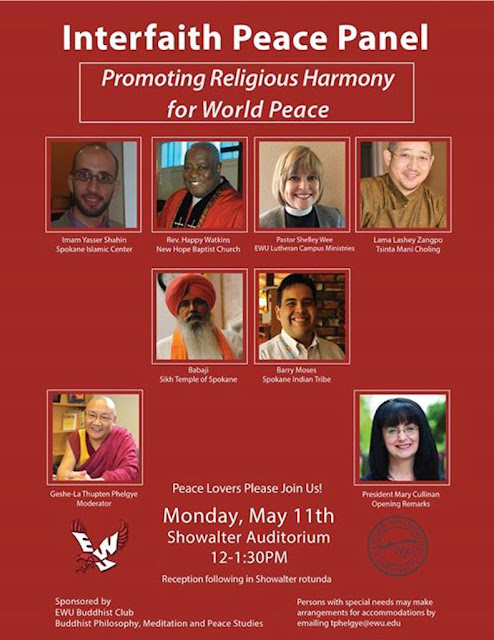
The Buddhist Club at Eastern Washington University organized an interfaith peace panel with representatives from Buddhism, Islam, Christianity, and indigenous spirituality. My friend Geshe Phelgye moderated the panel and invited me to participate. As always, it feels overwhelming to speak in a public forum where people might misunderstand my heart. I can only speak for myself, and not for anyone else in my communities.
The panelists were amazing. Every one of them impacted me in a positive way. I took notes and hopefully quoted each panelist as accurately as possible.
We watched a video before the event where Desmond Tutu was praising the current Dalai Lama. He said, “There is no way in which injustice, oppression, and evil can have the last word.”
Later, as Geshe-La introduced the panel, he said, “Prayer alone is not enough... Along with prayer, we need to engage with others to promote peace" and “Peace only happens when we communicate.”
Imam Yasser Shahin began his presentation by reciting part of the Quran. He said, “In the name of Allah, the most merciful, the most compassionate.” I have heard this phrase before, but in light of our discussion, I appreciated the reminder that God is both merciful and compassionate.
He said that saying hello to people will spread harmony more than keeping to oneself. “Peace starts with knowledge.” He encouraged the people to study other cultures and religions. He also said, “If you know that drawing the Prophet Mohammad offends many people, then you should stop drawing the Prophet Mohammad” and “It’s okay to debate, but we should refrain from arguing.”
The Reverend Happy Watkins told a touching story about meeting his mother in a bus. In front of all the people, she placed her hand upon him and prayed for the Lord to watch over her son. He said, “My mother had no idea what the future held, but she prayed to the future-holder.” His words reminded me of my own struggle after suffering a stroke. Likewise, I have no idea what the future holds for me. Lots of people make predictions and give advice, but only the Creator knows what my future will be.
He also said, “We have conquered the air and land, but we are not yet wise enough to displace war and hate” and “There’s hope for this Universe of the God we serve.”
Rev. Watkins spoke about the three institutions that give hope for our future: 1) The Institution of the Family, 2) The Institution of the Home, and 3) The Institution of the Kitchen Table.
Lama Lakshay said, “To hurt is not very pleasant.” He told a story about hurting a baby yak, and as a result of that hurt, the yak no longer trusted him.
Pastor Shelley Wee told a story about a young boy from her childhood who was kind of an outcast from the others. He was disliked and teased. Once day, he was singing, "Jesus loves me this I know, for the Bible tells me so." She recalled thinking, "I wish you wouldn't do that. People will only treat you worse."
Much later, she realized that the boy was part of her group in every way. He attended the same school. He came from the same racial background and the same socioeconomic class. He even attended the same church. She wondered how she could ever come to love people who were different, when she struggled so much with someone who was the same. I really appreciated the vulnerability and emotional honesty of her question.

After each panelist spoke, the audience got the chance to ask questions. Unfortunately, I didn't feel that the event allowed enough time to truly answer each question. For example, one man asked how our faith traditions could improve in promoting peace among the LGBT community. One or two people attempted a response, but I sensed something lacking.
This is not a critique of Geshe-La. My only hope is that we can continue to engage in courageous conversations in the future around these difficult topics.
Geshel-La, Imam Yasser Shahin, Rev. Happy Watkins, Lama Laskey Zangpo, Pastor Shelley Wee, and I.
Lama Laskey, Pastor Shelley, and I conversed briefly after the event.

















































